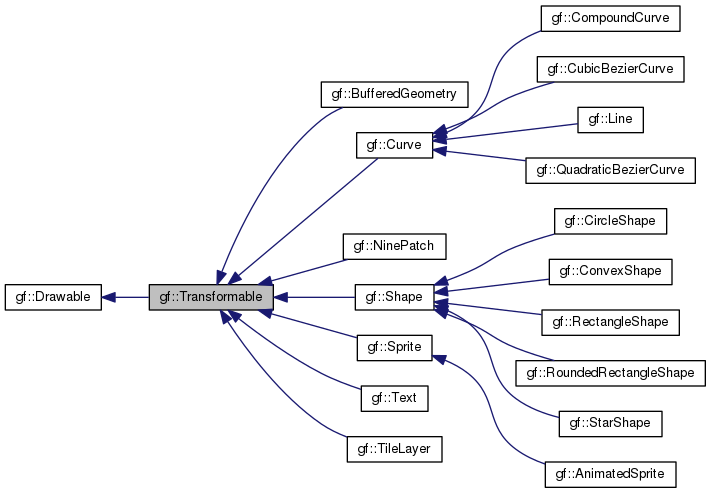 |
Gamedev Framework (gf)
0.3.0
A C++11 framework for 2D games
|
 |
Gamedev Framework (gf)
0.3.0
A C++11 framework for 2D games
|
Decomposed transform defined by a position, a rotation and a scale. More...
#include <gf/Transformable.h>

Public Member Functions | |
| Transformable () | |
| Default constructor. More... | |
| void | setOrigin (Vector2f origin) |
| Set the local origin of the object. More... | |
| Vector2f | getOrigin () const |
| Get the local origin of the object. More... | |
| void | setPosition (Vector2f position) |
| Set the position of the object. More... | |
| Vector2f | getPosition () const |
| Get the position of the object. More... | |
| void | move (Vector2f offset) |
| Move the object by a given offset. More... | |
| void | setRotation (float angle) |
| Set the orientation of the object. More... | |
| float | getRotation () const |
| Get the orientation of the object. More... | |
| void | rotate (float angle) |
| Rotate the object. More... | |
| void | setScale (Vector2f factors) |
| Set the scale factors of the object. More... | |
| void | setScale (float factor) |
| Set the scale factor of the object. More... | |
| Vector2f | getScale () const |
| Get the current scale of the object. More... | |
| void | scale (Vector2f factors) |
| Scale the object. More... | |
| void | scale (float factor) |
| Scale the object. More... | |
| Matrix3f | getTransform () const |
| Get the combined transform of the object. More... | |
| Matrix3f | getInverseTransform () const |
| Get the inverse of the combined transform of the object. More... | |
 Public Member Functions inherited from gf::Drawable Public Member Functions inherited from gf::Drawable | |
| virtual | ~Drawable () |
| Virtual desctructor. More... | |
| virtual void | draw (RenderTarget &target, RenderStates states)=0 |
| Draw the object to a render target. More... | |
Protected Member Functions | |
| void | setOriginFromAnchorAndBounds (Anchor anchor, const RectF &bounds) |
| Set the origin from an anchor and bounds. More... | |
Decomposed transform defined by a position, a rotation and a scale.
gf::Matrix3f, as a low-level class, offers a great level of flexibility but it is not always convenient to manage. Indeed, one can easily combine any kind of operation, such as a translation followed by a rotation followed by a scaling, but once the result transform is built, there's no way to go backward and, let's say, change only the rotation without modifying the translation and scaling. The entire transform must be recomputed, which means that you need to retrieve the initial translation and scale factors as well, and combine them the same way you did before updating the rotation. This is a tedious operation, and it requires to store all the individual components of the final transform.
That's exactly what gf::Transformable was written for: it hides these variables and the composed transform behind an easy to use interface. You can set or get any of the individual components without worrying about the others. It also provides the composed transform (as a gf::Matrix3f), and keeps it up-to-date.
In addition to the position, rotation and scale, gf::Transformable provides an "origin" component, which represents the local origin of the three other components. Let's take an example with a 10x10 pixels sprite. By default, the sprite is positioned/rotated/scaled relatively to its top-left corner, because it is the local point \((0, 0)\). But if we change the origin to be \((5, 5)\), the sprite will be positioned/rotated/scaled around its center instead. And if we set the origin to \((10, 10)\), it will be transformed around its bottom-right corner.
To keep the gf::Transformable class simple, there's only one origin for all the components. You cannot position the sprite relatively to its top-left corner while rotating it around its center, for example. To do such things, use gf::Matrix3f directly.
gf::Transformable can be used as a base class. That's what gf's sprites, texts, curves and shapes do.
| gf::Transformable::Transformable | ( | ) |
Default constructor.
By default:
| Matrix3f gf::Transformable::getInverseTransform | ( | ) | const |
Get the inverse of the combined transform of the object.
|
inline |
|
inline |
|
inline |
|
inline |
| Matrix3f gf::Transformable::getTransform | ( | ) | const |
Get the combined transform of the object.
The combined transform of the object is (in this order):
| void gf::Transformable::move | ( | Vector2f | offset | ) |
Move the object by a given offset.
This function adds to the current position of the object, unlike setPosition() which overwrites it. Thus, it is equivalent to the following code:
| offset | Offset |
| void gf::Transformable::rotate | ( | float | angle | ) |
Rotate the object.
This function adds to the current rotation of the object, unlike setRotation() which overwrites it. Thus, it is equivalent to the following code:
| angle | Angle of rotation, in radians |
| void gf::Transformable::scale | ( | Vector2f | factors | ) |
Scale the object.
This function multiplies the current scale of the object, unlike setScale() which overwrites it. Thus, it is equivalent to the following code:
| factors | Scale factors |
|
inline |
Scale the object.
This function is a shortcut when the scale factors for \( x \) and \( y \) are the same. It is equivalent to:
| factor | Scale factor |
| void gf::Transformable::setOrigin | ( | Vector2f | origin | ) |
Set the local origin of the object.
The origin of an object defines the center point for all transformations (position, scale, rotation). The coordinates of this point must be relative to the top-left corner of the object, and ignore all transformations (position, scale, rotation).
The default origin of a transformable object is \((0, 0)\).
| origin | New origin |
|
protected |
Set the origin from an anchor and bounds.
This function can be called from derived classes for setting the origin properly thanks to an anchor and the bounds they computed.
| anchor | An anchor |
| bounds | The bounds of the entity |
| void gf::Transformable::setPosition | ( | Vector2f | position | ) |
Set the position of the object.
This function completely overwrites the previous position. See the move() function to apply an offset based on the previous position instead.
The default position of a transformable object is \((0, 0)\).
| position | New position |
| void gf::Transformable::setRotation | ( | float | angle | ) |
Set the orientation of the object.
This function completely overwrites the previous rotation. See the rotate() function to add an angle based on the previous rotation instead.
The default rotation of a transformable object is \( 0 \).
| angle | New rotation, in radians |
| void gf::Transformable::setScale | ( | Vector2f | factors | ) |
Set the scale factors of the object.
This function completely overwrites the previous scale. See the scale() function to add a factor based on the previous scale instead.
The default scale of a transformable object is \((1, 1)\).
| factors | New scale factors |
|
inline |
Set the scale factor of the object.
This function is a shortcut when the scale factors for \( x \) and \( y \) are the same. It is equivalent to:
| factor | New scale factor |
 1.8.8
1.8.8